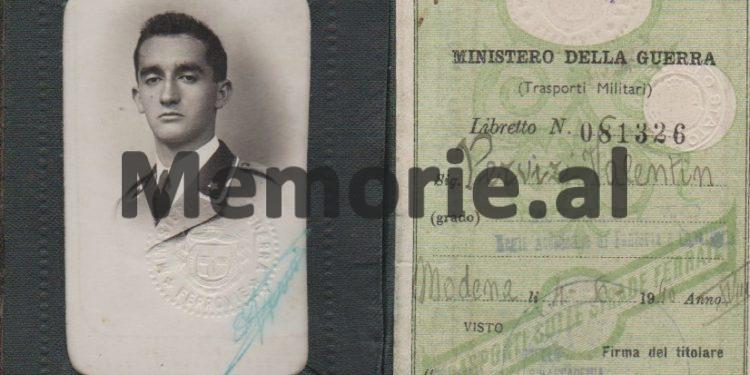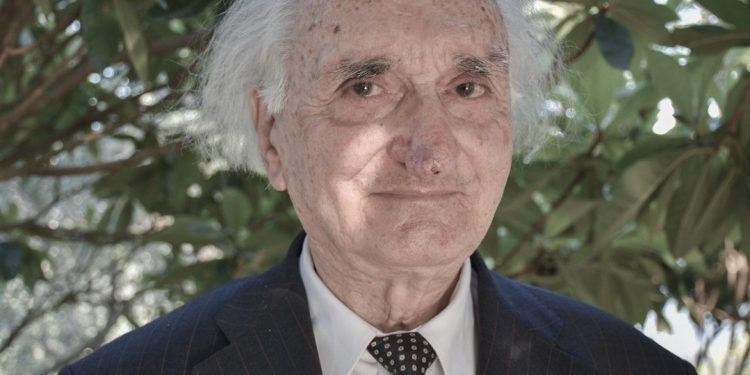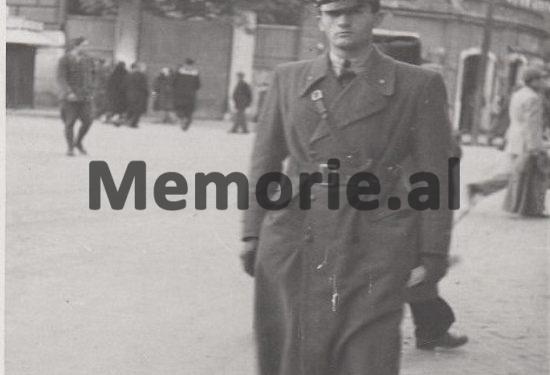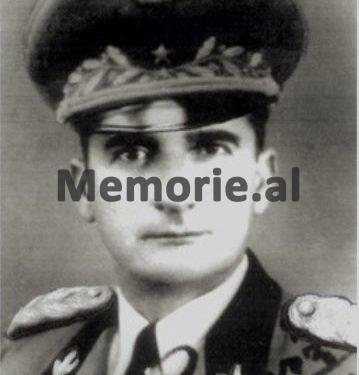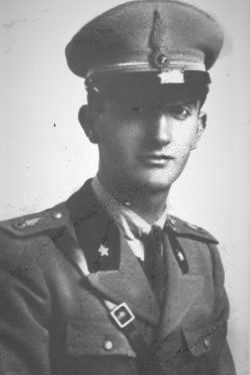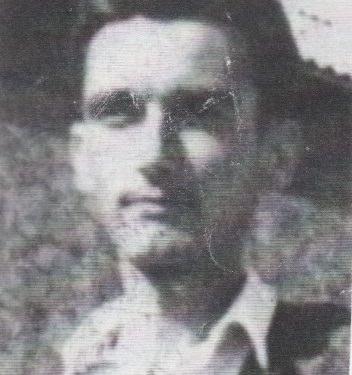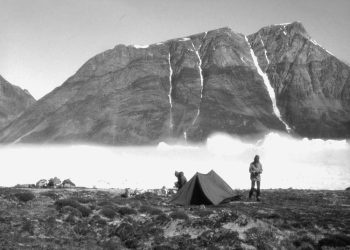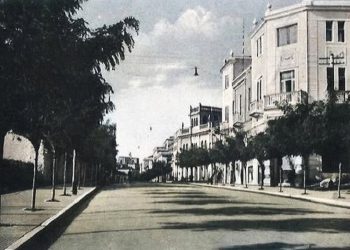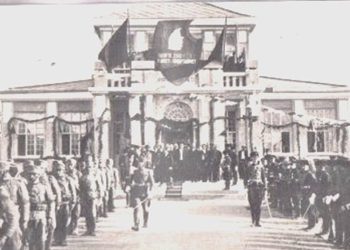Part Two
THE ODYSSEY OF INNOCENCE
To my brother Valentin, who for 47 years
endured the ideological storms of
communism, moreover, separated
from his wife, a true odyssey
in the twentieth century.
Memorie.al / When you enter Skuraj and cross the Urdhaza stream, the mountain ascent begins, through the hill known as Lekbibajve. You pass three mills in a row, known as those of Gjin Pjetri, which are built one after the other. You also pass the two-story tower of Ndrec Pjetri, Gjin’s younger brother, and then, you encounter a rocky ridge on which stands a complex of three stone buildings, the historical towers known as the towers of Gjin Pjetër Pervizi of Skuraj, leader of the Kurbin uprising. These buildings dominate the entire valley, which is formed by the union of the Mat and Fan rivers (a branch of the Mat), up to Milot. It is almost a fortress, which guards and protects the place from the expeditions of foreign invading armies, which could penetrate through that gorge, until they met the wall of the mountains of Skuraj, where the towers we mentioned were built.
Continued from the previous issue
Schools and Other Events
In Albania, a government decision was made to send a contingent of students to the Military School in Rome. But they had to have finished high school. My father called Valentin and told him that if he wanted to continue military school in Rome, he had to prepare to take the high school graduation exams. Valentin, who dreamed of a military career, agreed. My father, in agreement with the school in Turin, then assigned him a special course to prepare for the exams.
Valentin successfully passed this difficult test and thus, in September 1936, began military school in Rome, as the youngest of the other Albanian students, among them, Lek Vuksani (Vojvoda), Asim Zeneli, Avdi Mati, Minella Naçe, Abdyl Këllezi, Fiqëret Hoxha, Hamit Taga, Xhevat Hysa, Ali Ohri, Ernest Gjeçi, Shaban Begolli, Thoma Frashëri, Nuri Nuçi, Stefan Bumçi, etc. To be closer to each other, Genci came from Turin to Rome, to the ‘Santa Maria’ Institute, to finish high school there.
In 1937, I was also sent to this Institute, to the third grade of primary school. So, the three brothers were united in Rome. From the school in Turin, Valentin and Genci recalled the visits that Prince Umberto made there, where every time he went there, he met them and gave them gifts for the friendship and respect he had for our father, who had spent three years of a course with him at the War School.
On November 28, 1937, it was decided to celebrate the 25th anniversary of the Declaration of Independence. Thus all Albanian students from schools and military academies gathered in Tirana for the grand parade. Therefore, Valentin came with them. They were given a 10-day leave. After the celebration and the parade, we all gathered in Laç. Our parents were invited to the festive evening at the Royal Palace.
Genci and I had also come with an intervention from my father at our school in Rome. While the rest of us were gathered in Laç, my father had kept Valentin in Tirana, to introduce him to friends and well-wishers, and in a meeting that the military students had with the King, he presented him. King Zog congratulated Valentin for following the glorious path of his father, wishing him to be as capable as he was. This was the first and last time that Valentin met King Zog.
On this 25th anniversary, Gjin Pjetër Pervizi was also decorated, as a fighter and patriot of the Renaissance and leader of the Kurbin uprising, which was crowned with the raising of the national flag in Milot on November 28, 1912. My father was promoted to colonel and decorated with the high order of the “Besa” and with the high order of the “Crown of the Kingdom of Italy” for the mission in the Abyssinian War.
We spent that November of 1937 beautifully, and on the last three days of the month, my father and Valentin came to join us. It was a rare occasion that all of us, the family members, were together. The house was buzzing with friends coming and going, to congratulate us on the Great National Holiday. Valentin and Genci spent their time in the crowded guest room. The red and black flag was waving from the windows of the house. When friends came and went, they would line up in the garden in front of the house and fire a volley of shots.
From the Gendarmerie Post, other volleys would reply. There were some who had been in Milot when Gjin Pjetri had raised the flag on a large elm tree in the center of the market, greeting the declaration of independence with a few words and with the crack of the six-shooter he carried at his waist, which was followed by the crack of 300 rifles of the Kurbin fighters.
Our father, 15 years old, had experienced that event next to his uncle Gjin, at that historical moment. Gjin Pjetri’s revolver and other items were kept in our house. For my pleasure, as the youngest in the house, Ndue Pali, Gjin Pjetri’s nephew, who lived with us, let me shoot the six-shooter twice, which had cracked in many battles and in Milot, as we mentioned above. I could barely pull the trigger of the pistol with two fingers of both hands. It was a trigger for men’s fingers, not for children’s. But for a child like me, it was a beautiful, unforgettable memory.
Time passed and so did the leaves. My father had to return to Tirana and then to Korça. We did not have a car at that time. He had to go to the Post of Laç early, where a car from Shkodër would come to pick him up with some of his friends. That morning, we all went out to say goodbye to him. It was a cloudy day and a fine rain was falling, and it was cold. He was going to walk the field road in front of the house, to get to the main road and then to the Post. At that moment, Valentin suddenly intervened:
“No, father, you can’t go back the way you came, where everyone knows you will pass. It’s better to take the shortcut through the fields, which leads directly to the Post, which is safer.”
My father, after a brief silence, decided to follow Valentin’s advice, which he considered appropriate. He left that way, accompanied by three loyal men, Ndue Pali, Ndue Molla, and Bib Brozi, all armed. Not ten minutes had passed when a gunshot was heard. All of us who were there went out into the yard, looking in that direction. Then silence fell again. What had happened?! As they had passed on the path we mentioned and were walking carefully, because a kind of danger seemed to be felt, but from where?!
Ndue Pali, as he advanced in his direction, suddenly found himself in front of a suspicious movement, and something large rose up from behind a pile of bushes. His finger was on the trigger of his rifle, ready for any moment, and so he fired his weapon in that direction. But it was a large heron that had risen up, which, disturbed by the sound of Ndue’s steps, had flown away behind the bushes where it was hiding.
Those present laughed, while we were caught by anxiety, albeit briefly. Some others, hiding behind the oak trees and bushes somewhere along the main road, at the exit of our house’s road, were shocked, and the rifles they held ready seemed to have frozen in their hands. They had lost their “prey”! Or they weren’t wet and soaked, and they had started trembling from the cold. It was December.
That day was marked for something else, which proved Valentin’s intervention, who had an instinctive premonition of a danger to our father on that winter morning. You might say if you want that fate does not tie its own threads, according to a mysterious program, which conditions people’s behavior with surprising actions, outside of their logic and will! This event is a classic example of the intervention of fate. What prompted Valentin to intervene at the last moment, when my father was leaving?! A mystery!
When my father and his loyal men arrived at the post office, he was greeted in the office by the commander, Sergeant Lin Shllaku, from Shkodër, one of the best non-commissioned officers of the gendarmerie. While they were standing there, from the window that overlooked the inn of the man from Kruja, Shim Hoxha, they saw a line of six armed men, with their rifles hanging muzzle-down, soaked to the bone from the fine and cold morning rain. They entered the inn one after the other, to warm up with a glass of brandy. It didn’t even cross their minds that Prenk Pervizi was there and was watching them from the post office window. Otherwise, they wouldn’t have been there at all.
My father didn’t need any further explanation, giving a meaningful look to the sergeant, whom he considered a loyal man. The sergeant was stunned and his face was numb from what he had understood. Just then, the phone rang. My father immediately understood why. This coincided with the time my father was supposed to leave. How had they found out?! The sergeant picked up the phone. The caller did not introduce himself but asked who it was. The sergeant replied:
“It’s me, sir, Sergeant Lin Shllaku, the post commander.”
“Good. I wanted to know how things are going there. Is there any important news?” The voice sounded familiar.
“Yes, sir…?! No, no, complete calm, nothing to report,” the sergeant replied.
“What… really… nothing happened”?!
“No, sir, up to now that you are calling, nothing. Complete calm!” My father had intervened:
“Say hello to that friend from Prenk Pervizi.”
“Sir, you have many greetings from Colonel Prenk Pervizi, who is in my office.”
As soon as the sergeant said these words, there was a click as the phone was angrily slammed shut. My father smiled ironically, while the sergeant was surprised. On the phone had been a well-known person with a high position. At this time, my father descended from the Post and went straight into the inn, accompanied by the sergeant, his loyal men, and a couple of gendarmes. My father knew those rascals. When he appeared before them, they were stunned and terrified, wishing he was six feet under, as the saying goes. Meanwhile, my father said to them “Hello to you” and added:
“Did you come out to hunt ducks, men…?! Oh Shim Hoxha, pour them a glass of brandy from me, because they’re wet and tired for nothing… the hunt didn’t go well for them…! I didn’t know that ducks were hunted with military rifles. But I’ll tell you one thing. Be careful; don’t go hunting in bad weather, because you might catch an incurable cold…”!
This meaningful event, which we will also discuss in other writings, was therefore linked to Valentin, who with his instinctive intuition, managed to prevent a great tragedy with even greater consequences, for the family, the clan, and the region, as well as for the country. The personality of Prenk Pervizi at that time was very great, and his popularity and sympathy were very strong.
Any danger to his life could cause unrest and even unbridled revenge. His people and loyal men were brave and very determined. My father did not leave it at that, and he made it clear to the man whose voice he recognized, as well as to some others, about the consequences that could occur, and that for the time being, he was closing the matter there. We mentioned this event because it is related to Valentin, who had sensed that danger. So far, we have taken a look at his connection with the family, as well as his entry into school life, which would be crowned with his entry into a military career.
After we mentioned this last event, my father wanted to find out how his departure was known, on that day and at that hour! Perhaps the friends who would come from Shkodër by car talked carelessly, where there might have been someone connected to someone in Tirana or Kruja, who might have informed them of the day, time, and place of Prenk Pervizi’s departure from Laç…!
The Military School of Rome on April 7, 1939
Let’s focus on April 7, 1939, the blackest day in the history of Albania, which found the three of us in Rome. I was ten years old. Three Sundays earlier, some of his friends had come to our school with Valentin. They usually came every Sunday afternoon to take us and entertain us around Rome. Alfred Bonati and I, as the youngest, ended up at a cinema, while the older ones wandered around the streets and cafes.
This time they huddled in the corner of a café, along with Genci and Nikolla Bonati, where Alfred and I also stayed. Something was happening. Something was being cooked up to the detriment of Albania. The King, the army, resistance, war, patriotism, heroism, the megalomania of the Duce, the futility of Victor Emmanuel, fascism, baseness, betrayal, injustice, etc., were mentioned.
The League of Nations, England, America, Germany, Hitler, the expected world conflict, and so on, and so on. In the end, they took out their personal documents, photos, wristwatches, sealed envelopes, and other items, which they handed over to Genci and Nikolla Bonati, who put them in a handbag they had bought specifically for this purpose. These students and close friends, besides Valentin and Lek Vuksani (Vojvoda), were the ones we mentioned above: Asim Zeneli, Avdi Mati, Hamit Taga, Fiqeret Hoxha, Abdyl Këllezi, Xhevat Hysa, Shaban Blloshmi, Ernest Gjeçi, Ali Ohri, Stefan Bumçi, Ndue Lala, and some others whom I can no longer remember: more than 80 years have passed!
The matter was serious. If an incident occurred with Albania, the Italians could take drastic measures against the students of the military schools. In some cases, in other civilian schools and universities, such as; Rome, Naples, Turin, etc., the Albanian students had been treated well. They had been taken on a trip (cruise) on a tourist ship along the Mediterranean coasts. Lazër Radi told us how surprised they were by this good treatment. But, they immediately understood why.
But with the school in Rome and the other military schools, they had not acted that way. It was known that in the one in Rome, there was the most determined group of Albanian students, strongly united among themselves and loyal to the Kingdom, as sons of the best Zogist families. Therefore, at the meeting we mentioned, they expressed pessimism about their fate, because they were determined to implement the resistance and protest that was appropriate if that great tragedy of an invading attack on the Homeland by Italian fascism, as was rumored, were to happen.
It was Mussolini who had expressed that intention. He had all the state power of Italy in his hands, where King Victor Emmanuel III was only a puppet, with which the Duce played as he pleased. They were afraid that they could be arrested, imprisoned, and interned, foreseeing that any attack on Albania would be met with the determined resistance of the Albanian people, and of course, first and foremost, their fathers, who held important state or military functions. What we are writing happened about two weeks before the black day of April 7.
From that day of the handover of personal documents, they were no longer allowed to go out, and we knew nothing about them. The news of the attack and the landing of the Italian army in Durrës, which was announced with great fanfare by the Italian radio and press, paralyzed the entire life of the Italian population, who were realizing, but too late, where the Duce was leading them…! Where the fascist “mule” was taking them!
Genci, Nikolla, Alfred, and I heard it in the 8 a.m. news, in the school cafeteria, where all the boarders and professors had gathered, and were eating. Just then, the radio began to give the extraordinary communique of the invasion of Albania and full of boastful nonsense, etc. A heavy silence fell, like the silence of a grave. We remained stunned and with our heads down, petrified, in a daze.
We were only four Albanians, among more than 200 Italian boarders and professors. Everyone stopped eating and none of them said a word. Our presence seemed to condition their behavior, which took on the meaning of a kind of silent solidarity. In fact, the news came completely unexpectedly for them too, because they were used to the Duce’s arrogant expressions, empty nonsense, which he usually served to the Italians from the balcony of the Palazzo Venezia. Our school was known as a school that disregarded fascism, and it was a target. I was 10 years old, and Alfred was 12.
We remained in a daze, speechless, and our appetites were gone. Our friends were looking at us out of the corner of their eyes, in silence and with a worried look. They also understood the great sadness that had taken over our hearts and minds. Some from Calabria and Sicily, of Arbëresh origin, stood closer to us, and they too were saddened. From that moment on, we became like robots. Our actions and movements seemed completely artificial. It was as if we had moved from one world to another. The dimensions and content had changed. But how did the older and more mature people feel? Genci and Nikolla’s faces turned black, and no one dared to look at them, let alone say a word to them.
They had friendships and camaraderie with many of their friends, who seemed to carry that great sadness as well. I remember it as if it were today, that those two stayed for three days without putting anything in their mouths! It was as if a famine had fallen on the whole college. In those three days, the occupation of Albania had ended, without encountering any resistance. According to the radio, King Zog had fled to Greece from Korça. But our father, who was the commander in that city, had he also gone after the King?! These thoughts swirled in our minds. For two weeks, Valentin and his friends had not been allowed to go out or meet anyone. We knew nothing. The phone didn’t work. We found out everything later.
We tried to give a description of those terrible days that we experienced far from our homeland, when it found itself on the blackest day of its history, but there was even worse. We were about to have a heart attack when we heard from the radios the names of some Albanian personalities who were welcoming the Italian fascist occupation, which was coming to save the Albanians from the rule of the satrap Zog! The pages of Italian newspapers everywhere were filled with those names. Our hearts were trembling when we heard familiar names. Terror struck us, wondering what was happening now in Albania! We knew nothing about our people, neither about our father nor our mother, nor other family members. Complete silence.
And when after three days the final occupation was announced, and the King’s escape (fuga) to Greece was officially announced, we would have preferred to be six feet under. Our cheeks turned red with shame, and our eyes shone with tears from sorrow. What was happening to the Albanians?! Even though we were young, we felt all that oppressive weight of the occupation deeply, and the historical expression of the Gallic king Brennus came to mind, when they conquered Rome two thousand years ago: “Vae victis!” woe to the vanquished!
But the Romans replied with a sword in hand and defeated and drove out the barbaric Gauls. How would the Albanians respond?! The Italian communiques were enthusiastic. At six in the morning on April 7, the Italian forces had attacked Albania, in; Durrës, Vlorë, Shëngjin, and Saranda…! There had been no organized resistance.
Within two hours, Durrës, Vlora, Shëngjin, and Saranda were occupied. Only about eleven bersaglieri had been killed from an exchange of gunfire. It was learned later, from the self-sacrificing resistance of Mujo Ulqinaku. Where were the other Mujo Ulqinak’s?! No one else had fired a shot, as if into the air. On the same day, the Italian forces had headed toward Tirana, Shkodër, Gjirokastër, Fier, and Berat, where they had entered the next morning, and where they were reportedly greeted with flowers and applause (?).
After three days, Albania was completely occupied, when the Italians reached Korça, from where King Zog had crossed into Greece. The Albanian army was nowhere to be seen. The people were revolted, demanding weapons and shouting about betrayal. The weapons depots were empty! The cannons had no firing pins! Everything had ended! (We found out about these later).
Let’s return to the Military School in Rome. Locked up for two weeks in their dormitories, in only their undershirts and underwear, the Albanian students knew nothing of what we mentioned. Without a radio, without a newspaper, without any contact, guarded by armed carabinieri, and isolated, they didn’t know how to act.
One of their Italian friends managed to send them a note, where he informed them that Albania had already been occupied within three days, without a single shot fired. How is that possible?! Under these conditions, they decided to lower one of their friends, with the help of sheets, from the sixth floor, where they were. His name was Dull Osmani, from Kavaja, a hothead, who later became an aviator, one of the craziest ones.
Dulla climbed down like a monkey, and in his underwear and undershirt, he rushed to a kiosk and bought all the newspapers he could find, new and old. Five days had passed since the occupation. When Dulla arrived at the top of the building and climbed through the window, everyone rushed at him and took the newspapers from his hands, as if they were wild people, so confused were they by the secret news that had come from their Italian friend.
“It’s impossible for Albania to surrender without blood reaching the knees!” Lek Vuksani, this highlander from Dukagjin, had shouted. When the newspapers were unfolded in front of them, they couldn’t believe their eyes! No resistance, no blood, nothing else. Only betrayal, baseness, weakness, cowards, rascals. Where was the Albanian army, the honor of the nation?! Where was the King, the winged hero, the savior of the homeland?! Where were the general staff officers of Albania, whom they adored and had as symbols and heroes?!
Had the Albanian, who always sang of bravery, heroism, and resistance, fallen so low?! Where were the great-grandchildren of Bardhyl, of Lekë the Great, of Pyrrhus, of Agron and Teuta, of Bato, of Gjergj Kastrioti Skënderbeu?! Where were Oso Kuka, Mic Sokoli, Buletini, Idriz Seferi, Azemi and Shota, Tringa and Nora of Albania?! Where were Çerçiz Topulli, Themistokli Gërmenji, Selam Musa, Ded Gjo’ Luli, Gjin Pjetri, Prenk Bib Doda, and others?!
Asim Zeneli, who was the oldest among them, had spoken heavily and harshly, and had expressed his surprise at where those legendary commanders had ended up, such as; Colonels Muharrem Bajraktari, Prenk Pervizi, Fiqri Dine, Hysni Dema, and others?! And King Zog?! Had Albania fallen so low that neither the resistance of the Albanian army with the King at the head nor that of the brave and fighting people was seen anywhere?!
Something wasn’t right. Something had happened that smelled of betrayal. But who could betray their own homeland?! The rage of the young men reached its peak when they read on the front pages of the newspapers the names of some who were welcoming the entry of Italy! Betrayal, yes, betrayal! Death to traitors!
They immediately gathered and created the “Black Hand” group, for the elimination of all traitors whose names were in those newspapers. The first organization against the occupier and against those who sold the Homeland. What we have said here in this story is being given for the first time, as it truly happened. A steering committee was also chosen. Valentin was among the main ones.
He had always enjoyed the sympathy of his friends for his noble and manly attitude, for the respected name of his parent and family. And we have said it, at the head of this first anti-fascist and patriotic organization of Albania, were the same close friends: Asim Zeneli, Valentin Pervizi, Lek Vuksani, Hamit Taga, Avdi Mati, Abdyl Këllezi, Fiqëret Hoxha, Shaban Blloshmi, Minella Naçe, Xhevat Hysa, Ernest Gjeçi, Stefan Bumçi, Ali Brahimi, Ali Ohri, Ndue Lala, etc. Memorie.al




